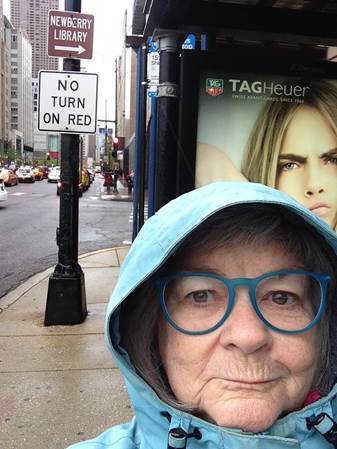Ah, the things I learn from the memoir-writers in my classes. Until civil rights advocate Regan Burke encouraged me to start up a class of my own here in Printer’s Row, I didn’t know a thing about “bibliotherapy,” the idea that writing memoir can help alleviate both emotional and physical pain. Regan’s guest post today might help you understand why I’ve become a believer.
Thank You, Alcoholic Writers
by Regan Burke
After my first few writing sessions in Beth Finke’s Memoir Writing Class, I asked her why there weren’t more stories about alcoholism. It seemed I was the only one reporting on this particular form of family madness in our weekly writing group. Beth assured me that alcoholism has been a common theme in several of her memoir writing classes over the years.
Ok, so that helped, to know that I’m not the only one. As an alcoholic myself who grew up with two alcoholic parents, I always start from a position of feeling like I don’t belong, like I’m too different to belong. The stigma of alcoholism and addiction doesn’t help. I’ve been sober for 42 years and I still feel like it’s a shameful condition, even after years of knowing it’s a medical condition, a mind-body disease.
Last week Beth sent me an essay by author Leslie Schwartz whose latest memoir is about her relapse and jail time. She writes:
In my case, addiction and the mental illness that follows has been one source of my creativity for a long time. I was able to use my experience of relapse and its devastating outcomes – I nearly lost my life – as fodder for my memoir The Lost Chapters: Finding Recovery and Renewal One Book at a Time.
Leslie spent her 37-day jail time immersed in reading the work of fellow writers who suffered from alcoholism/addiction (Raymond Carver, Sylvia Plath, Virginia Wolff). She studied the recent research about the link between mental illness and creativity by Nancy Andreasen and Kay Redfield Jamison.
Plenty has been written about expressive writing as a form of release from mood disorders — James Pennebaker, Dr. Howard Schubiner and others. Indeed, the Fourth Step of Alcoholics Anonymous’ 12 steps suggests writing a “searching and fearless moral inventory” as a way to shake the yoke of guilt and shame. It works.
After writing a few Fourth Steps, I continue to write memoirs to be free from the chronic pain of fibromyalgia as prescribed by Chicago doctor John Stracks. Bibliotherapy works for that, too. Writing is my journey to a higher quality of life.
I love that Leslie Schwartz uses the words “addiction” and “mental illness” interchangeably in her essay. “When I write, I feel sane,” she writes. “When I don’t write, I am lost.”
We desperately need addiction/alcoholism and mental illness to be thought of in new ways. Senator Ted Kennedy’s son Patrick (the one who very publicly slammed his car into the U. S. Capitol under the influence) founded the Kennedy Forum in an effort to wipe out the stigma of alcoholism and mental health. By promoting the medical evidence verifying that alcoholism/addiction/mental illness are brain disorders, the Kennedy Forum hopes to reduce the shame induced by the stigma that keeps alcoholics/addicts from getting help, keeps teens from telling their parents, keeps employees from using their medical insurance for rehab.
I’ve been sober since 1976 and it seems to me that the stigma is worse than it was 40 years ago. How do we break this? One way is for people in recovery programs like AA to stop acting like they are in a secret society and to open their meetings to those who are simply searching for information on how it works. Another way is for writers like Leslie Schwartz, Anne Lamott, Mary Karr and Brene Brown to keep writing their stories so people like me feel free to write ours.
This post was originally published on Regan Burke’s Back Story Essays blog.

Write on, Regan–and Beth!
Great post! I too realize the suffering that alcohol can bring. Recovery and finding people who love and understand is so important. Thanks for this writing and posting. Keep at it. This helped me relax and breathe to relax! Thanks.
Regan, I’ve read many of your writings on Beth’s website and am ALWAYS impressed by the genuine insights and thoughtfulness you have presented over these several years. In recent posts there have been many hints at the relationship between writing and therapy. None more emphatic or important as the one in this guest post. Thank you for being so open, honest, and critical. We all benefit from your words. At least one of us has.
Thank you Linda, Mary and Mel. I love you all for reading and commenting on my writing. It gives me the oomph to keep writing my book.
Leave a Response